Table of Contents
Social Science Answer key 2024
The Central Board of Secondary Education has conducted the CBSE Class 10 SST Exam. As the exam is now over, We provide the Class 10 Social Science Answer Key along with a full explanation. The CBSE SST Answer Key 2024 is designed by highly qualified experts and all of the answers provided in the Class 10 Social Science Answer Key 2024 are correct and error-free. Stay tuned and refresh page to get latest question and answers of the Class 10 Social Science answer key as soon as possible.
CBSE Class 10 Social Science Answer key 2024
The Central Board of Secondary Education conducts Class 10 in a single shift from 10:30 a.m. to 1:30 p.m. The Class 10 Social Science test takes three hours to complete. After sitting the exam, students are eagerly awaiting the CBSE Class 10 SST Answer Key 2024. To address this issue, the Adda247 Experience staff has provided you with an unofficial Class 10 Social Science Answer Key 2024 for all sets, as well as the CBSE Class 10 SST Board Question Paper 2024 PDF on this page.
CBSE Class 10 SST Answer Key 2024
When evaluating the Class 10 SST Answer Key 2024, you must first comprehend the paper design. The CBSE Class 10 Social Science Board Paper 2024 has 80 marks and lasts three hours. Students get an additional 15 minutes to review their question paper. CBSE Class 10th Social Science Syllabus includes components of History, Geography, Political Science, and Economics. Let’s take a short look at the CBSE Class 10 Social Science answer key 2024.
| Particulars | Details |
| Exam Conducting Body |
Central Board of Secondary Education (CBSE)
|
| Name of Examination |
CBSE Class 10 Board Examination 2024
|
| Subject | Social Science |
| Mode of Exam | Offline |
| Exam Duration | 3 Hours |
| Medium of Exam | English / Hindi |
| Type of Questions |
MCQs, Short and Long Answer Type Questions
|
| Theory Marks | 80 |
| Practical Marks | 20 |
| Total Marks | 100 |
| Passing Marks | 33% in aggregate |
Class 10 Social Science Answer Key 2024 All Sets
After completing the CBSE class 10 SST Exam paper, students should double-check their responses to each question. The CBSE class 10 SST Exam questions and answers are continually updated by Adda247 Experts. Once the exam is completed, you can utilize the CBSE Class 10 SST Answer Key 2024 to ensure that all correct answers are submitted. Check out the Class 10 Social Science Answer key 2024 of Sets 1, 2, and 3 below.
Class 10 Social Science Answer Key 2024 Set 1
Section A
1. Who among the following hosted the ‘Vienna Congress’ in 1815?
(A) Chancellor Duke Metternich
(B) Ernst Renan
(C) William I
(D) Otto von Bismarck
Answer: (A) Chancellor Duke Metternich
2. Which one of the following religions emerged from eastern India and spread in several directions through intersecting points on the silk routes’?
(A) Hinduism
(B) Christianity
(C) Buddhism
(D)) Jainism
Answer:(C) Buddhism
3. Arrange the following events in chronological order and choose the correct option.
I. Formation of Khilafat Committee in Bombay
II. Jallianwala Bagh Massacre
III. Bardoli Satyagraha
IV. Withdrawal of Non-Cooperation Movement
Options:
(A) I, II, III, IV
(B) II, I, IV, III
(C) I, II, IV, III
(D) III, IV, II, I
Answer:(B) II, I, IV, III
4. Choose the correct option to fill in the blank.
In the beginning of the 19th century, _________________ a girl married in a very orthodox household wrote an autobiography called ‘Amar Jiban’.
(A) Pandita Ramabai
(B) Rashsundari Devi
(C) Tarabai Shinde
(D) Kailashbashini Debi
Answer:(B) Rashsundari Devi
5. Match Column I with Column II and choose the correct option.
| Column I (National Park) | Column II (State) |
| i. Kaziranga ii. Jim Corbett iii. Sunderbans iv. Bandhavgarh |
a. Madhya Pradesh b. Assam C. Uttarakhand d. West Bengal |
Options:
(A) i-a, ii-b, iii-c, iv-d
(B) i-d, ii-c, iii-b, iv-a
(C) i-c, ii-b, iii-d, iv-a
(D) i-b, ii-c, iii-d, iv-a
Answer:(D) i-b, ii-c, iii-d, iv-a
6. In which one of the following states is ‘bamboo drip irrigation system’ prevalent ?
(A) Tamil Nadu
(B) West Bengal
(C) Meghalaya
(D) Odisha
Answer:(C) Meghalaya
7. Which one of the following is the highest ‘bauxite’ producing state of India?
(A) Maharashtra
(B) Jharkhand
(C) Gujarat
(D) Odisha
Answer:(D) Odisha
8. Two statements, I and II are given below. Read both the statements and choose the correct option.
Statement I : Division of power is good for democratic systems.
Statement II: It helps to reduce the possibility of conflict between social groups
Options:
(A) Statement I is true, but II is false.
(B) Statement I is false, but II is true.
(G) Statements I and II are true and II is the correct explanation of I.
(D) Statements I and II are true, but II is not the correct explanation of I.
Answer:(D) Statements I and II are true, but II is not the correct explanation of I.
.9.. Choose the most appropriate option.
Subject list in the Indian Constitution
Subjects
(A) Union List– Defense and Commerce
(B) State List—Police and Agriculture
(C) Concurrent List– Forest and Communication
(D) Residuary Subjects- Computer Software and Trade
Answer:(B) State List—Police and Agriculture
10. Read the following provisions regarding Secularism in the Indian Constitution and choose the correct option.
I. The Indian State has not adopted any religion as its official religion.
II. The Constitution gives freedom to all the citizens to practice and propagate any religion.
III. The Constitution declares any kind of discrimination done on the basis of religion to be legal.
IV. It gives the government the right to intervene in religious matters for ensuring equality within religious communities.
(A) Only I, II and III are correct.
(B) Only I, II and IV are correct.
(C) Only I, III and IV are correct.
(D) Only II, III and IV are correct.
Answer:(D) Only II, III and IV are correct.
11. Which one of the following steps has been taken by the Election Commission of India to reform political parties?
(A) Amended the Constitution to prevent defection.
(B) Candidates will have to give the details of criminal cases on affidavit.
(C) Candidates will have to give details of their property on affidavit.
(D) It has been made mandatory for all parties to conduct organizational elections and file income tax returns.
Answer:(D) It has been made mandatory for all parties to conduct organizational elections and file income tax returns.
12. Two statements are given below. They are Assertion (A) and Reason (R). Read both the statements and choose the correct option.
Assertion (A): Multi-party system has been adopted in India.
Reason (R) : It is capable of accommodating all the social and geographical differences in India.
Options:
(A) Both (A) and (R) are true and (R) is the correct explanation of (A).
(B) Both (A) and (R) are true, but (R) is not the correct explanation of (A).
(C) (A) is true, but (R) is false.
(D) (A) is false, but (R) is true.
Answer:(A) Both (A) and (R) are true and (R) is the correct explanation of (A).
13. Which one of the following is a scheduled language as per the Constitution of India?
(A) Bhojpuri
(B) Garhwali
(C) Nepali
(D) Rajasthani
Answer:(C) Nepali
14. Two statements, I and II are given below. Read both the statements and choose the correct option.
Statement I: Women are now actively contributing to various professions including roles as doctors, engineers, lawyers, managers and university teachers.
Statement II: Political expression of gender division and political mobilization helped to improve women’s role in public life.
Options:
(A) Statement I is true, but II is false.
(B) Statement I is false, but II is true.
(C) Statements I and II are true and II is the correct explanation of I.
(D) Statements I and II are true, but II is not the correct explanation of I.
Answer:(C) Statements I and II are true and II is the correct explanation of I.
15. In one of the small villages, a farmer borrows money from the village moneylender at a high monthly interest rate but is not able to repay it back. Next, he borrows it from a bank at a lower interest rate. Gradually he earns and pays back the loan to the moneylender and the bank.
Which of the following best describes the role of the bank in this credit situation?
(A) The bank acts as a cooperative lender.
(B) The bank facilitates a debt-trap situation.
(C) The bank ensures a fair exchange of goods.
(D) The bank saves the farmer from debt-trap.
Answer:(D) The bank saves the farmer from debt-trap.
16. Look at the given picture. The work being done in the picture comes under which one of the following economic sectors ?
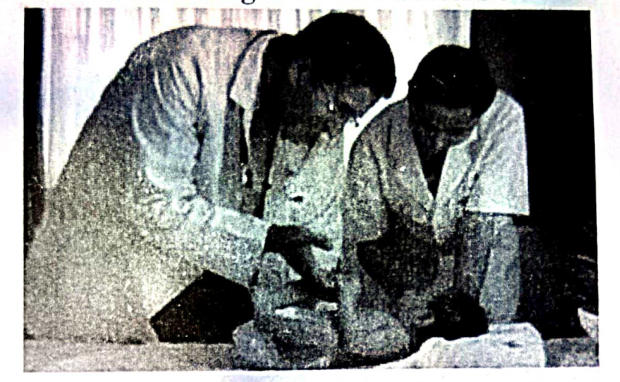
Answer:
(A) Primary
(B) Secondary
(C) Tertiary
(D) Quaternary
Answer: (C) Tertiary
Note: The following question is for the Visually Impaired Candidates only, in lieu of Q. No. 16.
‘Floriculture’ comes under which one of the following sectors of the economy?
(A) Primary
(C) Tertiary
(B) Secondary
(D) Quaternary
Answer:(A) Primary
17. Two statements are given below. They are Assertion (A) and Reason (R). Read both the statements and choose the correct option.
Assertion (A): Rural poor families are still dependent on informal sources of credit.
Reason (R) : For obtaining loan from banks, collateral and special documents are required.
Options:
(A) Both (A) and (R) are true and (R) is the correct explanation of (A).
(B) Both (A) and (R) are true, but (R) is not the correct explanation of (A).
(C) Both (A) (A) is true, but (R) is false.
(D) (A) is false, but (R) is true
Answer:(A) Both (A) and (R) are true and (R) is the correct explanation of (A).
18. Which one of the following is included in ‘liberalization’?
(A) Promoting trade barriers
(B) Removing trade barriers
(C) Controlling the other country through trade
(D) Increasing import, export duty on goods
Answer:(B) Removing trade barriers
19. Which one of the following sectors has the highest share in employment in India?
(A) Primary
(B) Secondary
(C) Tertiary
(D) Quaternary
Answer:(A) Primary
20. Select the formal sources of credit from the given sources and choose me correct option.
I. Bank
II. Moneylender
III. Cooperatives
IV. Businessman
Options:
(A) Only I and II
(B) Only II and III
(C) Only I and III
(D) Only I and IV
Answer:(C) Only I and III
SECTION B
(Very Short Answer Type Questions) (4×2=8)
1. Why was the Indian subcontinent central to the flows of the trading network before the sixteenth century? Explain.
(a) “Minerals occur in igneous and metamorphic rocks.” Explain the statement with an example.
OR
(b) “The ocean waters contain vast quantities of minerals.” Explain the statement with an example.
Why was the need for de-centralisation recognized in the Indian Constitution? Explain.
24. How have the developments in information and communication technology been the major factor in enabling globalization? Explain.
Class 10 Social Science Answer key 2024 Set 2
SECTION A
(Multiple Choice Questions) (20×1=20)
1. In which one of the following states is ‘bamboo drip irrigation system’ prevalent ?
(A) Tamil Nadu
(B) West Bengal
(C) Meghalaya
(D) Odisha
Answer:(C) Meghalaya
2. Match Column I with Column II and choose the correct option.
| Column I (National Park) | Column II (State) |
| i. Kaziranga ii. Jim Corbett iii. Sunderbans iv. Bandhavgarh |
a. Madhya Pradesh b. Assam C. Uttarakhand d. West Bengal |
Options:
(A) i-a, ii-b, iii-c, iv-d
(B) i-d, ii-c, iii-b, iv-a
(C) i-c, ii-b, iii-d, iv-a
(D) i-b, ii-c, iii-d, iv-a
3. Choose the correct option to fill in the blank.
In the beginning of the 19th century, a girl married in a very orthodox household wrote an autobiography called ‘Amar Jiban’.
(A) Pandita Ramabai
(B) Rashsundari Devi
(C) Tarabai Shinde
(D) Kailashbashini Debi
Answer:(B) Rashsundari Devi
4. Arrange the following events in chronological order and choose the correct option.
I. Formation of Khilafat Committee in Bombay
II. Jallianwala Bagh Massacre
IV. Withdrawal of Non-Cooperation Movement
Bardoli Satyagraha
Options:
(A) I, II, III, IV
(B) II, I, IV, III
(C) I, II, IV, III
(D) III, IV, II, I
Answer: (B) II, I, IV, III
5. Which or of the following religions emerged from eastern India and spread in several directions through intersecting points on the ‘silk routes’?
(A) Hinduism
(B) Christianity
(C) Buddhism
(D) Jainism
Answer: (C) Buddhism
6. Who among the following hosted the ‘Vienna Congress’ in 1815 ?
(A) Chancellor Duke Metternich
(B) Ernst Renan
(C) William I
(D) Otto von Bismarck
A: (A) Chancellor Duke Metternich
7. Select the formal sources of credit from the given sources and choose the correct option.
I. Bank
II. Moneylender
III. Cooperatives
IV. Businessman
Options:
(A) Only I and II
(B) Only II and III
(C) Only I and III
(D) Only I and IV
8. Which one of the following sectors has the highest share in employment in India?
(A) Primary
(B) Secondary
(C) Tertiary
(D) Quaternary
9. Which one of the following is included in ‘liberalization’?
(A) Promoting trade barriers
(B) Removing trade barriers
(C) Controlling the other country through trade
(D) Increasing import, export duty on goods
10. Two statements are given below. They are Assertion (A) and Reason (R). Read both the statements and choose the correct option.
Assertion (A): Rural poor families are still dependent on informal sources of credit.
Reason (R) : For obtaining loan from banks, collateral and special documents are required.
(A) and (R) are true and (R) is the correct explanation of (A).
(B) Both (A) and (R) are true, but (R) is not the correct explanation of (A).
(C) (A) is true, but (R) is false.
(D) (A) is false, but (R) is true.
11. In one of the small villages, a farmer borrows money from the village moneylender at a high monthly interest rate but is not able to repay it back. Next, he borrows it from a bank at a lower interest rate. Gradually he earns and pays back the loan to the moneylender and the bank.
Which of the following best describes the role of the bank in this credit situation?
(A) The bank acts as a cooperative lender.
(B) The bank facilitates a debt-trap situation.
(C) The bank ensures a fair exchange of goods.
(D) The bank saves the farmer from debt-trap.
12. Two statements, I and II are given below. Read both the statements and choose the correct option.
Statement I: Women are now actively contributing to various professions including roles as doctors, engineers, lawyers, managers and university teachers.
Statement II: Political expression of gender division and political mobilization helped to improve women’s role in public life.
Options:
(A) Statement I is true, but II is false.
(B) Statement I is false, but II is true.
(C) Statements I and II are true and II is the correct explanation of I.
(D) Statements I and II are true, but II is not the correct explanation of I.
13. Which one of the following is a scheduled language as per the Constitution of India?
(A) Bhojpuri
(B) Garhwali
(C) Nepali
(D) Rajasthani
14. Two statements are given below. They are Assertion (A) and Reason (R). Read both the statements and choose the correct option.
Assertion (A): Multi-party system has been adopted in India.
Reason (R) : It is capable of accommodating all the social and geographical differences in India.
Options:
(A) Both (A) and (R) are true and (R) is the correct explanation of (A).
(B) Both (A) and (R) are true, but (R) is not the correct explanation of (A).
(C) (A) is true, but (R) is false.
(D) (A) is false, but (R) is true.
15. Which one of the following steps has been taken by the Election Commission of India to reform political parties?
(A) Amended the Constitution to prevent defection.
(B) Candidates will have to give the details of criminal cases on affidavit.
(C) Candidates will have to give details of their property on affidavit.
(D) It has been made mandatory for all parties to conduct organizational elections and file income tax returns.
CBSE Class 10 Social Science Answer Key 2024 Set 3
SECTION A
(Multiple Choice Questions)
1. Select the formal sources of credit from the given sources and choose the correct option.
I. Bank
II. Moneylender
III. Cooperatives
IV. Businessman
Options:
(A) Only I and II
(B) Only II and III
(C). Only I and III
(D) Only I and IV
2. Which one of the following sectors has the highest share in employment in India?
(A) Primary
(B) Secondary
(C) Tertiary
(D) Quaternary
3. Which one of the following is included in ‘liberalization’?
(A) Promoting trade barriers
(B). Removing trade barriers
(C) Controlling the other country through trade
(D) Increasing import, export duty on goods
4. Two statements are given below. They are Assertion (A) and Reason (R). Read both the statements and choose the correct option.
Assertion (A): Rural poor families are still dependent on informal sources of credit.
Reason (R) : For obtaining loan from banks, collateral and special documents are required.
Options:
(A) Both (A) and (R) are true and (R) is the correct explanation of (A).
(B) Both (A) and (R) are true, but (R) is not the correct explanation of (A).
(C) (A) is true, but (R) is false.
(D) (A) is false, but (R) is true.
5. In one of the small villages, a farmer borrows money from the village moneylender at a high monthly interest rate but is not able to repay it back. Next, he borrows it from a bank at a lower interest rate. Gradually he earns and pays back the loan to the moneylender and the bank.
Which of the following best describes the role of the bank in this credit situation?
(A) The bank acts as a cooperative lender.
(B) The bank facilitates a debt-trap situation.
(C) The bank ensures a fair exchange of goods.
(D). The bank saves the farmer from debt-trap.
6. Which one of the following is a scheduled language as per the Constitution of India?
(A) Bhojpuri
(B) Garhwali
(C) Nepali
(D). Rajasthani
8. Two statements are given below. They are Assertion (A) and Reason (R). Read both the statements and choose the correct option.
Assertion (A): Multi-party system has been adopted in India.
Reason (R) : It is capable of accommodating all the social and geographical differences in India.
Options:
(A). Both (A) and (R) are true and (R) is the correct explanation of (A).
(B) Both (A) and (R) are true, but (R) is not the correct explanation of (A).
(C) (A) is true, but (R) is false.
(D) (A) is false, but (R) is true.
9. Which one of the following steps has been taken by the Election Commission of India to reform political parties?
(A). Amended the Constitution to prevent defection.
(B) Candidates will have to give the details of criminal cases on affidavit.
(C) Candidates will have to give details of their property on affidavit.
(D) It has been made mandatory for all parties to conduct organizational elections and file income tax returns.
10. Read the following provisions regarding Secularism in the Indian Constitution and choose the correct option.
I. The Indian State has not adopted any religion as its official religion.
II. The Constitution gives freedom to all the citizens to practice and propagate any religion.
III. The Constitution declares any kind of discrimination done on the basis of religion to be legal.
IV. It gives the government the right to intervene in religious matters for ensuring equality within religious communities.
Options:
(A) Only I, II and III are correct.
(B), Only I, II and IV are correct.
(C) Only I, III and IV are correct.
(D) Only II, III and IV are correct.
12. Two statements, I and II are given below. Read both the statements and choose the correct option.
Statement I : Division of power is good for democratic systems.
Statement II: It helps to reduce the possibility of conflict between social groups.
Options:
(A). Statement I is true, but II is false.
(B) Statement I is false, but II is true.
(C). Statements I and II are true and II is the correct explanation of I.
(D) Statements I and II are true, but II is not the correct explanation of I.
13. Which one of the following is the highest ‘bauxite’ producing state of India?
(A) Maharashtra
(B) Jharkhand
(C) Gujarat
(D) Odisha
14. In which one of the following states is ‘bamboo drip irrigation system’ prevalent?
(A) Tamil Nadu
(B) West Bengal
(C) Meghalaya
(D) Odisha
16. ‘Floriculture’ comes under which one of the following sectors of the economy?
(A) Primary
(B) Secondary
(C) Tertiary
(D) Quaternary
(17) Choose the correct option to fill in the blank. In the beginning of the 19th century,_______________ a girl married in a very orthodox household wrote an autobiography called ‘Amar Jiban’.
(A) Pandita Ramabai
(B) Rashsundari Devi
(C) Tarabai Shinde
(D) Kailashbashini Debi
18. Arrange the following events in chronological order and choose the correct option.
I. Formation of Khilafat Committee in Bombay
II. Jallianwala Bagh Massacre
III. Bardoli Satyagraha
IV. Withdrawal of Non-Cooperation Movement
Options:
(A) I, II, III, IV
(B), II, I, IV, III
(C) I, II, IV, III
(D) III, IV, II, I
19. Which one of the following religions emerged from eastern India and spread in several directions through intersecting points on the ‘silk routes’?
(A) Hinduism
(B) Christianity
(C) Buddhism
(D) Jainism
20. Who among the following hosted the ‘Vienna Congress’ in 1815?
(A), Chancellor Duke Metternich
(B) Ernst Renan
(C) William I
(D) Otto von Bismarck
CBSE Class 10 Social Science Answer Key 2024 Paper Set (32/1/1)
1. From which of the following countries Giuseppe Garibaldi belonged to?
(a) Austria
(b) Italy
(c) Greece
(d) Spain
Answer: (b) Italy
2.Two statements are given below. They are Assertion (A) and Reason (R).
Read both the statements and choose the correct option.
Assertion (A): The most serious source of nationalist tension in Europe after 1871 was Balkan.
Reason (R): A large part of the Balkan was under the control of Ottoman Empire.
Options:
(a) Both, (A) and (R) are true and (R) is the correct explanation of (A).
(b) Both, (A) and (R) are true but (R) is not the correct explanation of (A).
(c) (A) is true but (R) is false.
(d) (A) is false but (R) is true.
Answer: (a) Both, (A) and (R) are true and (R) is the correct explanation of (A).
3.Arrange the following events in chronological order and choose the correct option from the following:
I.Treaty of Constantinople
II.Defeat of Napoleon
III.Unification of Italy
IV.Unification of Germany
Options :
(a) I, II, IV and III
(b) II, III, I and IV
(c) II, I, IV and III
(d) IV, I, III and II
Answer: (c) II, I, IV and III
4.Which one of the following pairs regarding Indian nationalism is correctly matched?
Leaders Contribution
(a) Sardar Patel : Hindustan Socialist Republican Army
(b) Bhagat Singh : Swaraj Party
(c) C.R. Das : Bardoli Satyagraha
(d) Jawahar Lal Nehru : Oudh Kisan Sabha
Answer:(d) Jawahar Lal Nehru : Oudh Kisan Sabha
5.Choose the correctly matched
(a) Ferrous – Natural Gas
(b) Non-Ferrous – Nickel
(c) Non-Metallic Minerals – Limestone
(d) Energy Minerals – Cobalt
Answer: (c) Non-Metallic Minerals – Limestone
6.Read the given statements and choose the correct option with regard to Rabi cropping season from the following :
I.Rabi crops are sown in winter.
II.Sown from October to December and harvested from April to June.
III.Important crops are Maize, Cotton, Jute.
IV.Punjab, Haryana, Uttar Pradesh are important for the production of wheat.
Options :
(a) I, III and IV
(b) II, Ill and IV
(c) I, II and IV
(d) I, II and III
Answer: (c) I, II and IV
7.Identify the soil with the help of following information.
It develops in areas with high temperature.
It is the result of intense leaching due to heavy rain.
Humus content is low.
Soil :
(a) Arid soil
(b) Yellow soil
(c) Laterite soil
(d) Black soil
Answer: (c) Laterite soil
8.Which of the following term refers to the belief in and advocacy for the social, political and economic equality of women?
(a) Patriarchy
(b) Matriarchy
(c) Socialist
(d) Feminists
Answer: (d) Feminists
9.Read the given statements :
India has no official religion.
All the communities have freedom to profess and practice any religion in India.
Which one of the following constitutional term is used for the above statements ?
(a) Republic
(b) Secular
(c) Sovereign
(d) Socialist
Answer: (b) Secular
11.Which of the following was the primary objective of Belgium to form the separate government in Brussels?
(a) Promoting cultural events.
(b) Managing international relations.
(c) Enforcing local laws.
(d) Ensuring linguistic accommodation.
Answer: (d) Ensuring linguistic accommodation.
12.Which one of the following countries has two-party system?
(a) China
(b) United Kingdom
(c) India
(d) Pakistan
Answer:(b) United Kingdom
13.What role do ‘checks and balances’ play in a democratic country?
Choose the most suitable option from the following.
(a) To establish a direct form of government without representatives.
(b) To create a separation of powers to prevent from authoritarianism.
(c) To prevent any change to the Constitution.
(d) To ensure absolute power for one branch of government.
Answer: (b) To create a separation of powers to prevent from authoritarianism.
14.Suppose, the monthly income of the family members is as follows respectively :
Mother – Rs. 50,000/-
Father – Rs. 40,000/-
Son – Rs. 20,000/-
Daughter – Rs. 20,000/-
The average income of the family would be :
(a) Rs. 32,000/-
(b) Rs. 30,000/-
(c) Rs. 32,500/-
(d) Rs. 33,000/-
Answer:(c) Rs. 32,500/-
15.Which one of the following indices is given priority by the World Bank with respect to development?
(a) Infant Mortality Rate
(b) Equality
(c) Body Mass Index
(d) Per Capita Income
Answer: (d) Per Capita Income
16.Choose the correct option to fill in the blank.
Removing barriers or restrictions on business and trade set by the government is called as ____________.
(a) Disinvestment
(b) Special Economic Zones
(c) Liberalisation
(d) Foreign Direct Investment
Answer: (c) Liberalisation
17. Which one of the following is an example of organized sector activities?
(a) A farmer irrigating his field.
(b) A handloom weaver working in her house.
(c) A headload worker carrying cement.
(d) A teacher taking classes in a government school.
Answer: (d) A teacher taking classes in a government school.
Class 10 SST Answer Key & Question Paper Analysis
Students can view the CBSE Class 10 SST Exam Analysis 2024 following the test. We evaluate the question paper in CBSE Class 10 SST Exam Analysis 2024 based on the number of wrong questions, the number of questions that are not part of the syllabus, and the difficulty level of the question paper. We presented a section-by-section Class 10 Social Science Paper Analysis based on a review by Students and experts.
|
CBSE Class 10 SST Exam Analysis
|
||
|
Section
|
Type of Questions
|
Difficulty Level
|
|
Section A
|
MCQs
|
Very Easy
|
|
Section B
|
Very Short Answer Type Questions
|
Very Easy
|
|
Section C
|
Short Answer Type Questions
|
Moderate
|
|
Section D
|
Long Answer Type Questions
|
Moderate
|
|
Section E
|
Case Study Based Questions
|
Easy
|
|
Section F
|
Map Based Questions
|
Very Easy
|
|
|
Overall difficulty level of the paper | Easy to moderate |
Class 10 Social Science Paper Analysis by Students
We talked to some of the students who just came out from the examination center after taking the SST Paper. As per most students’ Initial reactions, The CBSE Class 10 SST Paper was Easy to moderate in difficulty level and well-balanced.
- Most of the questions were basic and relevant to the subject. No Out of Questions were asked.
- The paper was well-balanced, covering a variety of topics from the curriculum.
- The most helpful resource for exam preparation was NCERT.
- The map questions were repeated from prior years.
- Questions based on case studies necessitated extensive analytical skills.
- Some students raised concerns about time management, believing the assignment was too long to finish in the allotted three hours.
- Thus, based on the overall response, the Social Science paper’s difficulty level was moderate, providing a decent balance for the majority of students.
- There was nothing unexpected about the paper, therefore the exam was more predictable and manageable.
Class 10 SST Paper Analysis by Experts
Experts also described the work as well-balanced and of ordinary difficulty. They verified that the paper consisted largely of straightforward questions based on the CBSE syllabus. Some of the experts’ replies are cited below:
- The paper was more analytical and application-based in accordance with CBSE sample paper guidelines.
- The question paper was designed to assess students’ critical thinking skills and mastery of the prescribed book. It was generally student-friendly.SST Paper Class 10 2024 PDF Download
The CBSE Class 10 SST Papers 2024 will be available here after completion of the Class 10 SST Examination. By downloading the Class 10 SST Question Papers and consulting the Class 10 SST Answer Key 2024, candidates can ascertain what outcomes they can anticipate.
| CBSE Class 10 SST Question Paper 2024 Pdf Download |
|
| CBSE SST Paper Class 10 2024 Set 1 | Download PDF |
| CBSE Class 10 Board SST Paper 2024 Set 2 | Download PDF |
| CBSE Class 10 SST Question Papers 2024 Set 3 | Download PDF |
Class 10 Social Science Marking Scheme
The marking scheme of CBSE Social Science (SST) must be known to the students while analyzing the SST Answer key. The Class 10 Social Science question paper will be divided into 5 sections namely Section A, Section B, Section C, Section D, Section E, and Section F.
- Section A contains 20 multiple-choice questions (MCQs) worth one mark each.
- Section B consists of four two-point questions.
- Section C consists of five three-point questions.
- Section D is made up of four 05-point questions.
- Section E includes three case-based integrated assessment units (04 points each) with subparts of 1, 1, and 2 points.
- Section F consists of five five-point questions.
There is no overall option on the question paper. However, a few queries have included an internal choice. Only one of the options in such queries must be attempted. The question paper pattern for CBSE Class 10 Social Science board exam 2024 is given here.
| Section | Number of Questions | Type of Questions | Marks Per Question | Total Weightage |
| A | 20 | MCQs | 1 | 20 |
| B | 4 | Very Short Answer Type Questions | 2 | 8 |
| C | 5 | Short Answer Type Questions | 3 | 15 |
| D | 4 | Long Answer Type Questions | 5 | 20 |
| E | 3 | Case-Based Questions | 4 | 12 |
| F | 1 | Map Based | 5 | 5 |
| Total | 37 | 80 Marks |
CBSE Class 10 SST Answer Key 2024 with Solution (All Sets Question)
1. Which one of the following aspects was the base of the Bretton Woods system?

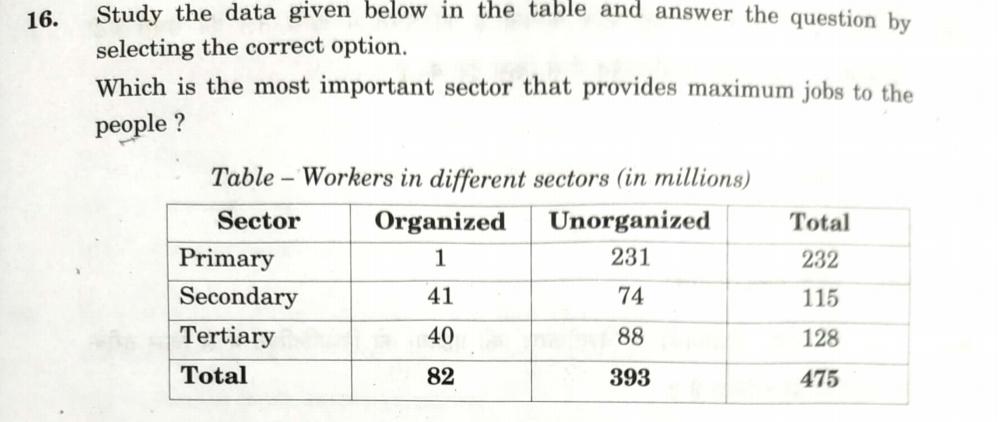
(a) Primary sector, especially organized sector
Solution Key
| Section A(32/5/1) | ||||||
| 1. (c) | 2. (c) | 3. (d) | 4. (b) | 5.(c) | 6.(a) | 7.(d) |
| 8.(b) | 9.(b) | 10.(d) | 11.(d) | 12.(d) | 13.(d) | 14.(c) |
| 15.(d) | 16.(d) | 17.(c) | 18.(d) | 19.(d) | 20.(d) | |
Section B
(Very Short Answer Type Questions) (4×2=8)
21. Why did Europeans flee to America in the 19th century? Explain.
22. Communalism is harmful for the nation.” Explain.
23. (a) Energy saved is energy produced. Support the statement.
Or
Why is there a pressing need to use non-conventional energy resources? Explain
34. Suggest any two ways to create more employment in the rural sector
SECTION C
(Short Answer Type Questions) (5×3=15)
25. (a) Explain any three effects of Non-Co-operation Movement on the Indian economy
OR
(b) How was the Rowlatt Act opposed by the people of India? Explain with three examples.
26. Explain the importance of pipelines as a means of transportation in India
27. Describe the impact of flexibility in the labour laws on the workers in India
28. Transparency is the most important feature of a democracy Support the statement.
29. Which are the two sectors based on the ownership of resources? Explain each of them.
SECTION D
(Long Answer Type Questions) (4×5-20)
30. (a) Explain the process of unification of Italy.
OR
(b) How did the French Revolution play an important role in creating the idea of the ‘Nation’ in Europe? Explain.
31. (a) Explain the importance of manufacturing industries.
OR
(b) Explain any five ways to reduce industrial pollution.
32. (a) Explain any five challenges faced by political parties in India OR
(b) Explain any five major functions of the political parties
33. (a) How does credit play a positive and a negative role? Explain with examples.

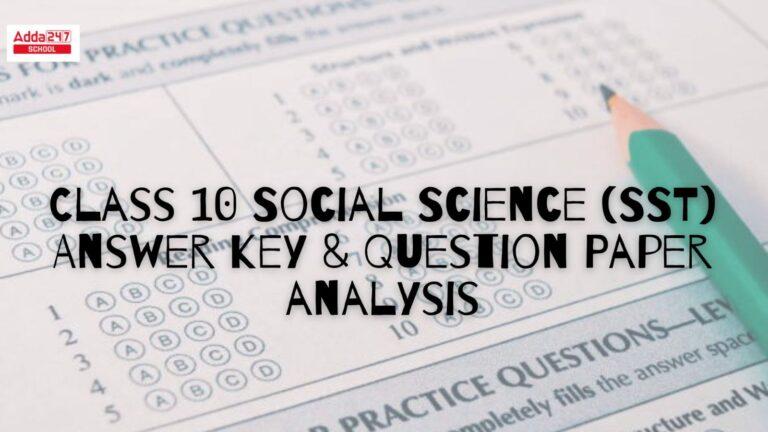


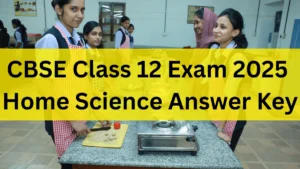 CBSE Class 12 Home Science Answer Key 20...
CBSE Class 12 Home Science Answer Key 20...
 CBSE Class 12 History Answer Key 2025, G...
CBSE Class 12 History Answer Key 2025, G...
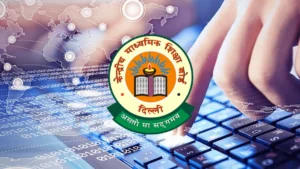 CBSE Class 12 Computer Science Answer Ke...
CBSE Class 12 Computer Science Answer Ke...










